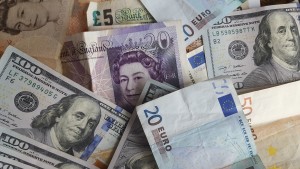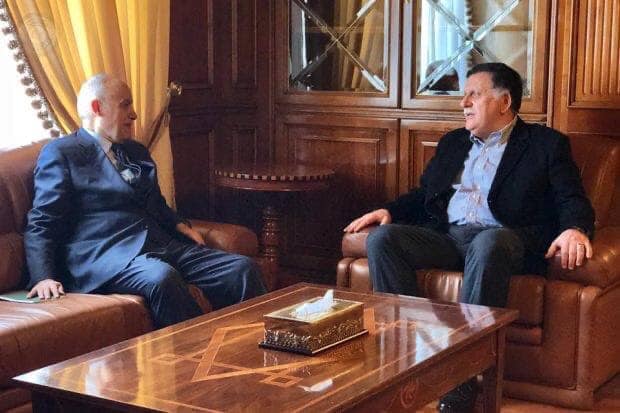By Sami Zaptia.

London, 31 July 2019:
The Faiez Serraj Presidency Council and Government of National Accord, together with the Tripoli-based Central Bank of Libya (CBL), yesterday announced that they will be reducing the official foreign currency sale surcharge by seven percent from 4 August.
The surcharge had been – since it was announced last autumn – set at 183 percent. The new surcharge will be 163 percent. This will be added to the official dinar-dollar exchange rate of 1.40.
In practice, previously one U.S. dollar used to cost the Libyan citizen LD 3.99 -including all the charges. With the new surcharge rate, one dollar will cost LD 3.71, a saving of about LD 0.28 or about seven percent.
The reduction in the foreign currency sale surcharge also coincides with an announcement by the Tripoli CBL on 30 July that it will be resuming the stalled sale of the annual foreign currency family allowance from 20 August.
However, this will only be at a tranche of US $ 500 rather than the previously announced US $ 1,000.
It will also be recalled that the Libyan citizen is also allowed a maximum US $ 10,000 annual transfer for private use on things such as education or health.
The announcement, and specifically its timing, has surprised many analysts. It was understood that as part of the economic reforms announced last September that the CBL would gradually reduce the surcharge in its efforts to narrow the gap between the official dollar exchange rate (1.40) and the black-market foreign currency exchange rate which stood at LD 4.50/dollar just before the announcement.
At one point last night black-market FX rate fell to as low as LD 4.10 per dollar.
However, it was not expected that the surcharge would be reduced by the usually policy conservative Tripoli authorities smack in the middle of an ongoing war with the Khalifa Hafter forces.
Indeed, for years, the policy conservative and reform shy Tripoli CBL has hidden behind instability and insecurity to avoid and postpone any reform.
The move will also reduce the amount of liquidity going into state coffers which has been instrumental in reducing – but not eradicating- the cash crisis.
This has led to speculation that the moves were politically motivated. Indeed, Libya is currently at a (another!) peak state of insecurity and instability – not the ideal time to introduce economic or monetary reforms – according to the Tripoli CBL.
In fact, the cash crisis has returned again with queues forming again outside banks with the advent of the Eid Al-Adha (sacrifice) feast next week.
This has led critics to interpret the move as a “political bribe” to “distract attention” from the war with Hafter and ensure continued popular support – or support – in the western region for the Faiez Serraj administration and the Tripoli CBL, and to reduce the build up of any possible tension.
Indeed, monetary and financial critics insist that there are better ways to help the economy and reduce the burden on the Libyan citizen.
They insist that more effective economic reform would have involved the unification of all the various foreign currency sale surcharges that the CBL uses for different uses (government and private) rather than continuing with a multi FX tier which is very much conductive to abuse and to “legalized corruption”.
Equally, most commentators and business leaders that Libya Herald
spoke to were adamant that these foreign currency sales benefited and will only continue to benefit Libya’s better off and middle class who have sufficient savings to buy their annual dollar allocation.
These, they insist, represent no more than 20% of the population.
They insist that 80 percent of the population will sell their allocations on the black-market, as they have no funds to buy their US $ 500 even at the lowest official rate of LD 1.40.
Moreover, critics insist that the difference in official surcharge rates will increase the money supply by about LD 8 billions and will exert further pressure on the official FX rate.
They maintain that, in the short term and for the average Libyan citizen, the reduction in the foreign currency sale surcharge is very much welcomed.
It will come as a gift of free cash which will be used to pay off debts or buy goods and services.
But, while in the short term this is good for the population, analysts believe it to be bad for Libya’s long term fiscal and monetary policy, and that ultimately, the Libyan citizen will end up paying the final bill.
https://www.libyaherald.com/2018/09/13/libyas-economic-reforms-a-tax-levy-on-foreign-currency-sales-increased-currency-allowances/
https://www.libyaherald.com/2018/09/13/long-promised-economic-reforms-agreed/
https://www.libyaherald.com/2018/12/04/libyan-dinar-gains-value-as-economic-reforms-take-effect/
https://www.libyaherald.com/2019/01/11/budget-and-economic-reform-talks-held-in-tunis-by-libyan-sovereign-entities/
https://www.libyaherald.com/2018/11/24/libyas-economic-reforms-have-been-successful/








